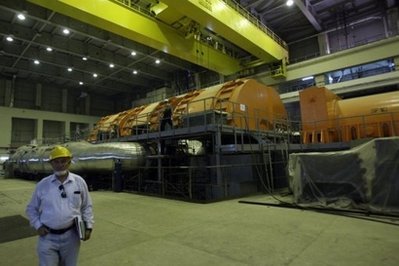IAEA Experts Hold Talks on Nuclear 'Differences' in Iran

Experts from the U.N. atomic watchdog were holding talks in Tehran Wednesday aimed at reaching accord on inspections that would allow investigations into a possible military dimension of Iran's nuclear drive.
The discussions are taking place two weeks ahead of a new round of talks between Iran and six world powers in parallel diplomatic efforts, which are due to resume in Kazakhstan on February 26 after an eight-month hiatus.
Inspectors from the International Atomic Energy Agency and an Iranian nuclear team led by Tehran's IAEA envoy Ali Asghar Soltanieh, began talks in the morning, the ISNA news agency reported.
President Mahmoud Ahmadinejad said that in Wednesday's negotiations Iran's rights to pursue peaceful nuclear technology had to be protected.
"It is certain that Iran's definite rights should be respected, as well as law, regulations and agreement between Iran and the agency," he told reporters on the sidelines of a cabinet meeting.
The goal of the meeting in Tehran, the third of its kind in the past three months, is to "finalize the structured approach document", according to Herman Nackaerts, the IAEA's chief inspector who is leading the delegation to Tehran.
The document would "facilitate the resolution of the outstanding issues related to the possible military dimension of Iran's nuclear program," Nackaerts told journalists at Vienna airport on Tuesday.
But "differences remain... we will work hard to try to resolve these differences," he said. "We will have good negotiations."
The Vienna-based agency says "overall, credible" evidence exist that until 2003 and possibly since Iran conducted nuclear weapons research.
Vehemently rejecting the charges, Iran has denied the IAEA broader access to sites, scientists and documents involved in these alleged military activities.
The IAEA is hoping to gain access to Parchin, a military base near Tehran where the agency suspects Iran could have carried out experiments with explosives capable of triggering a nuclear weapon.
Iran's foreign ministry spokesman Ramin Mehmanparast raised prospects Tuesday that inspection of the Parchin military site by the IAEA would be possible in the context of a "comprehensive agreement" that recognizes its right to peaceful nuclear energy.
Previous demands by the IAEA to visit the base were spurned by Iran, which insists agency inspectors already visited Parchin twice in 2005 and found nothing untoward.
But the agency counters that activity at Parchin spotted by satellite, including moving "considerable" volumes of earth, makes it it want to go back.
The United States, Israel and Western powers suspect the Islamic republic is masking the development of a nuclear weapons capability under the guise of a program Iran insists is purely aimed at peaceful purposes.
In November, the U.S. warned that if there was no progress in a deal between Iran and the IAEA, it would push for the U.N. agency at its next meeting from March 4-8 to take the rare step of referring Tehran to the U.N. Security Council.
U.S. President Barack Obama on Tuesday called on Iran to end the standoff over its nuclear drive by addressing international concerns.
"The leaders of Iran must recognize that now is the time for a diplomatic solution, because a coalition stands united in demanding that they meet their obligations," Obama said in his State of the Union address.
The P5+1 group of the U.S., China, Russia, Britain, France and Germany have urged Tehran to to scale back parts of its nuclear work. Those calls have been rejected by Iran because it was not offered sanctions relief in return.
Iran is slapped by multiple sets of U.N. Security Council sanctions for its refusal to stop uranium enrichment. The United States and the European Union have also imposed their own additional sanctions.



